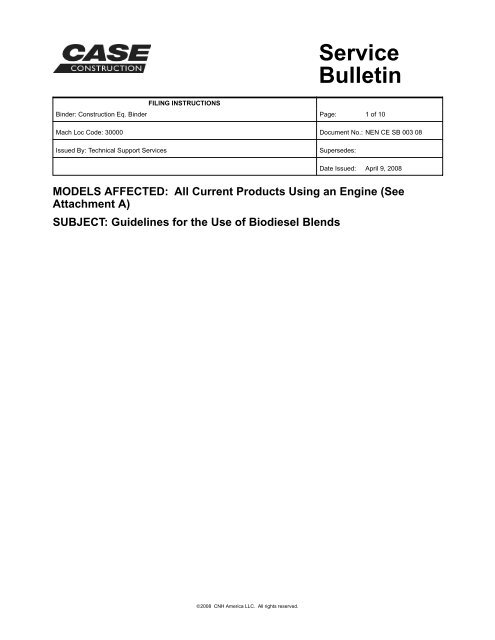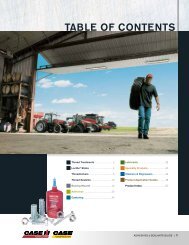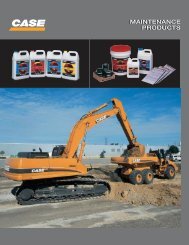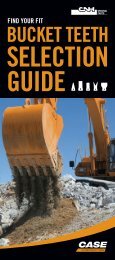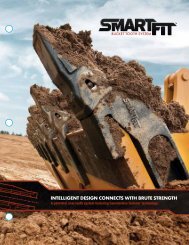Biodiesel Fuels - Sequoia Equipment Company
Biodiesel Fuels - Sequoia Equipment Company
Biodiesel Fuels - Sequoia Equipment Company
You also want an ePaper? Increase the reach of your titles
YUMPU automatically turns print PDFs into web optimized ePapers that Google loves.
ServiceBulletinFILING INSTRUCTIONSBinder: Construction Eq. Binder Page: 1 of 10Mach Loc Code: 30000 Document No.: NEN CE SB 003 08Issued By: Technical Support ServicesSupersedes:Date Issued: April 9, 2008MODELS AFFECTED: All Current Products Using an Engine (SeeAttachment A)SUBJECT: Guidelines for the Use of <strong>Biodiesel</strong> Blends2008 CNH America LLC. All rights reserved.
Guidelines for the Use of <strong>Biodiesel</strong> Blendsfor Case Construction <strong>Equipment</strong>1) Introduction on FAME <strong>Biodiesel</strong>.FAME <strong>Biodiesel</strong> (Fatty Acid Methyl Ester), <strong>Biodiesel</strong> in the following, consists of a family offuels derived from vegetable oils treated with methyl esters.Among the <strong>Biodiesel</strong> production, there are two main <strong>Biodiesel</strong> types: RME (Rapeseed MethylEster or a blend of Rapeseed and Sunflower Methyl Ester) the preferred crop in Europe andSME (Soybean Methyl Ester) the preferred crop in the United States.<strong>Biodiesel</strong> is a renewable alternative fuel source, its use and development is promotedworldwide especially in Europe and in the United States.<strong>Biodiesel</strong> fuel can be used to run Diesel engines as pure <strong>Biodiesel</strong> or when blended withstandard Diesel:B5: indicates the blend of 5% <strong>Biodiesel</strong> and 95% Diesel.B20: indicates the blend of 20% <strong>Biodiesel</strong> and 80% Diesel.B100: indicates pure <strong>Biodiesel</strong>, or 100% <strong>Biodiesel</strong>.<strong>Biodiesel</strong> has several positive features in comparison with Diesel:<strong>Biodiesel</strong> adds lubricity to the fuel, which is beneficial in many circumstances, particularlyas sulphur and aromatics are removed from the fuel.<strong>Biodiesel</strong> has a greater Cetane number and burns cleaner.<strong>Biodiesel</strong> produces less particulates and smoke emissions.<strong>Biodiesel</strong> is fully biodegradable and is non toxic.2) Diesel and <strong>Biodiesel</strong> specification.Diesel fuel specification is covered by the following requirements and test methods:Europe: EN590North America: ASTM D975Pure <strong>Biodiesel</strong> (B100) specifications are covered by the following:Europe:EN 14214, and DIN51606 - Automotive fuels. Fatty Acid Methyl Ester (FAME) for Dieselengines. Requirements and test methods.United States:ASTM D6751 - Standard Specification for <strong>Biodiesel</strong> Fuel Blend Stock (B100) for MiddleDistillate <strong>Fuels</strong>.In both cases, Europe and the United States, the raw oil must undergo a process calledtransesterification to remove the glycerides before it is converted to <strong>Biodiesel</strong> suitable forblending and being burnt in a diesel Engine. The transesterification process is a reaction of theoil with an alcohol to separate the glycerin from the fat or vegetable oil. This process leavesbehind two products: Methyl Ester (the chemical name of <strong>Biodiesel</strong>) and Glycerin (a by-productusually sold to be used in soaps or other products).
<strong>Biodiesel</strong> fuels approved for use must be transesterified and must comply with theEuropean Standard EN14214, German DIN51606 or the North America Standard ASTMD6751.Cold Pressed <strong>Biodiesel</strong>, Cold Pressed Oil, Straight Vegetable Oil (SVO), or moregenerally unrefined vegetable oils used as motor fuel, are fuels that are normally made fromOil Seed Rape or similar high oil content crops. These kinds of fuel are not transesterified,so they do not fulfill the EN14214, DIN51606, and ASTM D6751 requirements. There is norecognized quality standard available for these types of fuel.Therefore, the use of Cold Pressed <strong>Biodiesel</strong>, Cold Pressed Oil, Straight Vegetable Oil(SVO), or more generally unrefined vegetable oils used as motor fuel are “NOTAPPROVED” at any blend.Any engine and fuel system found to have run with any blend of NON APPROVED fuel(fuel not fulfilling the specification described in the requirement EN 14214 or DIN51606 forEurope or ASTM D6751 for the United States) will no longer be covered for Warranty.The effects of <strong>Biodiesel</strong> on engine performance can be summarized as follows:Up to B5:no effect on performanceUp to B20: 1% to 3% reduction in power / torqueThe customer, by using <strong>Biodiesel</strong>, must accept the reduced power. Lower performancemeans an increase in fuel consumption; the End User is not allowed to modify theengine / injection pump settings to recover the reduced performance.3) <strong>Biodiesel</strong> usage conditions.The <strong>Biodiesel</strong> usage conditions must be stringently followed by the End User. Incorrectapplication of the <strong>Biodiesel</strong> usage conditions could lead to severe damage to both the engineand the fuel injection equipment.The main concerns related to the operation with <strong>Biodiesel</strong> are:Filters and injector blockage caused by poor fuel qualityWear and corrosion of internal components due to water content affecting lubricityDeterioration of some rubber sealing compounds in the fuel system<strong>Biodiesel</strong> oxidation that can lead to the formation of deposits which can harm the injectionsystem of the engineAny problem in the engine or fuel system associated with non-compliance to thefollowing conditions for <strong>Biodiesel</strong> fuel handling and maintenance will not be covered forWarranty.Blends up to B5<strong>Biodiesel</strong> blends up to and including B5 are approved for use in Case engines as noted in theCase <strong>Biodiesel</strong> Approval Guidelines. For non- Case engines, follow the engine manufacture’sguidelines for <strong>Biodiesel</strong> blends. The <strong>Biodiesel</strong> blend stock must meet the EN 14124, DIN51606, or ASTM D6751 fuel specification and the fuel supplier must maintain good fuel quality.
Blends greater than B5 through B20The use of <strong>Biodiesel</strong> blends above B5 through B20 is approved for most machines using CaseTier 2 and newer emissions compliant engines as specified in the attached listing. For non-Case engines, follow the Engine Manufacturer’s Guidelines for <strong>Biodiesel</strong> Blends.Any engine or fuel system found to have run with non-approved blends or withoutadherence to recommended oil and filter change intervals will no longer be covered forWarranty.The use of <strong>Biodiesel</strong> blends above B5 through B20 will not void the Case engine warranty aslong as the following conditions for <strong>Biodiesel</strong> fuel handling and maintenance are stringentlyfollowed:<strong>Biodiesel</strong> blend stock must meet the fuel specifications listed above (EN14214, DIN 51606,or ASTM D6751).<strong>Biodiesel</strong> meeting the fuel standards listed above must be purchased from a trustedsupplier that understands the product and maintains good product quality. It is highlyrecommended that you use <strong>Biodiesel</strong> from BQ 9000 accredited suppliers to maintain thequality and the consistency of the fuel.NOTE: The BQ 9000 Quality Management Program is accredited by the National <strong>Biodiesel</strong>Board for producers and marketers of <strong>Biodiesel</strong> fuel. See the National <strong>Biodiesel</strong> Boardwebsite at www.biodiesel.org for more information.<strong>Biodiesel</strong> must be purchased pre-blended from the supplier. Mixing the diesel fuel and<strong>Biodiesel</strong> on-site can result in a non-homogeneous mixture that can lead to problems.Case can not honor warranty if there is a problem associated with poor fuel quality due toimproper blending. It is the responsibility of the fuel supplier and / or the End User to makesure the right type of fuel and blend are delivered and used.Care must be taken when handling the fuel to assure water does not enter the supply.<strong>Biodiesel</strong> will actually attract water vapors out of the air. Fuel tanks must be kept as full aspossible to limit the amount of air and water vapors in them. Drain water from engine andmachine fuel filters on a regular basis, at least once a week.Check the engine oil dipstick daily to ensure that the level is maintained between thenormal minimum and maximum. If the oil level increases above the maximum marking,verify that the increase is not due to overfill of the engine. If increase is not due to overfill,do not use the machine and contact your Case dealer.Due to potential oxidation and stability problems with <strong>Biodiesel</strong>, the fuel must not be storedin on–site storage tanks for more than 3 months. If it is, it cannot be used as fuel for adiesel engine.Likewise, potential oxidation and stability could be a problem with the fuel stored in yourmachine. Machines must not be stored for more than 3 months with <strong>Biodiesel</strong> blends inthe fuel system. If long storage periods are necessary, the engine must run on pure dieselfuel for 20 hours to flush the <strong>Biodiesel</strong> fuel out of the engine fuel system prior to storage.When changing over to <strong>Biodiesel</strong> use, it may be necessary to change fuel filters once ortwice prior to the normal change interval. <strong>Biodiesel</strong> can loosen rust and particles from theinside of on-site fuel storage tanks and vehicle fuel tanks that would normally adhere to thesides of the tank and not cause any problems. These particles will then be trapped by thevehicle fuel filters and cause shortened filter life and filter blockage.
Complete cleaning of the whole on-site handling system and storage tanks may be requiredin some instances. Use a fuel filter and water separator and make sure the storage tanks,fuel lines and fittings are compatible with <strong>Biodiesel</strong>.Use a biocide during the spring and summer months; this prevents problems with bacterialgrowth in the system.As <strong>Biodiesel</strong> has a higher cloud point than conventional diesel, the Case minimaltemperature limit for <strong>Biodiesel</strong> usage without low temperature additives is set for blendsgreater than B5 through B20 at -9º C (+16º F). If the temperature is below this limit, theCustomer must switch from <strong>Biodiesel</strong> to a blended diesel suitable for the ambienttemperature, for continued machine operation.Refer to the attached machine listing to determine the type of engine fitted in everymachine model, and the maximum <strong>Biodiesel</strong> blend approved:Any spillage of <strong>Biodiesel</strong> must be cleaned up immediately before it can cause damage tothe paintwork of the machine.Maintenance Intervals for blends greater than B5 through B20The use of <strong>Biodiesel</strong> blends above B5 in Case engines may require shortened oil and filterchange intervals depending upon the engine and type of <strong>Biodiesel</strong> fuel used. Case enginesoperated with RME (Europe) can be operated with the standard service intervals defined in theoperator’s manual for the machine. Case engines operating on SME <strong>Biodiesel</strong> (North America)may require a shortened interval defined by the attached chart. Those machines requiringshortened intervals are noted as “AC-H”.MAINTENANCE INTERVALS (AC-H Machines)Oil 1250 hrsOil Filter250 hrsCCV Filter (If equipped)250 hrs1 Oil type ACEA E3/5 (Europe) & API CH4 (North America) or better requiredFor non- Case engines, follow the Engine Manufacturer’s Guidelines for <strong>Biodiesel</strong> Blends.4) Warranty on Fuel Injection <strong>Equipment</strong>Despite Case approving the use of <strong>Biodiesel</strong> blends according to the list in <strong>Biodiesel</strong> ApprovalGuidelines, some Diesel Fuel Injection <strong>Equipment</strong> Manufacturers may only permit B5 as themaximum blend. Fuel Injection <strong>Equipment</strong> Service Agents may reject warranty for equipmentused with <strong>Biodiesel</strong> blends greater than B5. In these cases the warranty claim must beforwarded directly to Case. Warranty claims will only be considered if approved blends havebeen used and the conditions for <strong>Biodiesel</strong> fuel handling and maintenance were followed.The majority of problems found on injection systems running with <strong>Biodiesel</strong> are relatedto poor quality of the fuel.
5) <strong>Biodiesel</strong> usage in previous / out of production modelsFor machines with Case engines that precede compliance to the Tier 2 emissions regulationsand for machines out of production, more generally for all earlier machines not detailed in thefollowing list, the only approved blends are up to, and including B5. No evaluations on the useof greater <strong>Biodiesel</strong> blends were carried out in previous models and their engines. <strong>Biodiesel</strong>deteriorates old type rubber, seals etc, and conclusive tests have not been performed witholder engines.For non- Case engines, follow the engine manufacture’s guidelines for <strong>Biodiesel</strong> blends.Any engine fitted to a Case machine (with an existing warranty) not present in theattached document (a previous model or out of production model), found to have runwith <strong>Biodiesel</strong> blend greater than B5, will be not be covered by Case Warranty.6) <strong>Biodiesel</strong> usage on machines with exhaust after treatment devicesFor machines fitted with exhaust after treatment devices such as diesel particulate filters(DPFs) or Selective Catalytic Reduction (SCR), consult with the device supplier to determine ifthe device is compatible with <strong>Biodiesel</strong>.
Attachment A2008 <strong>Biodiesel</strong> Approval GuidelinesCase CE <strong>Equipment</strong> - North AmericaRevision L February 22, 2008Approval Code:A = Approved w/ no limitationsAC = Approved - must follow Case Guidelines for <strong>Biodiesel</strong> Blends above 5%AC-H = Approved - must follow Case HPCR Engine Guidelines for <strong>Biodiesel</strong> BlendsM = Follow Engine Manufacturers Guidelines for <strong>Biodiesel</strong> BlendsN/A = Not ApprovedModelRating kW(hp)EngineDisplacement(L)<strong>Biodiesel</strong> ApprovalARTICULATED TRUCKS325 185 (248) Cummins 6CTAA-8.3 8.3L A AC327 224 (300) Iveco Cursor 10.3L A AC327 B 224 (300) Iveco Cursor 10.3L A AC330 213 (286) Cummins QSM 10.8L A AC330 260 (349) Iveco Cursor 10.3L A AC330 B 260 (349) Iveco Cursor 10.3L A AC335 284 (380) Iveco Cursor 13 12.9L A AC335 B 306 (410) Iveco Cursor 13 12.9L A AC340 318 (426) Iveco Cursor 13 12.9L A AC340B 340 (456) Iveco Cursor 13 12.9L A ACCOMPACT TRACK LOADERS (SSL)420CT Series 3 55 (74) FPT 432T/M3 3.2L A AC440CT Series 3 67 (89) NEF 445T/M3 4.5L A AC445CT 60 (80.5) NEF 445/M2 4.5L A AC445CT Series 3 61 (82) FPT 432T/M3 3.2L A AC450CT 65.7 (88) NEF 445T/M2 4.5L A AC450CT Series 3 67 (89) NEF 445T/M3 4.5L A ACCOMPACTION EQUIPMENTDV201 20 (27) Deutz F2L1011F 1.7L A MDV202 20 (27) Deutz F2L1011F 1.7L A MDV204 27.6 (38) Deutz F3L1011F 2.3L A MSV208 75 (100) Cummins B4.5-C99 4.5L A ACSV210 75 (100) Cummins B4.5-C99 4.5L A ACSV212 101 (135) Cummins QSB5.9-C155 5.9L A ACSV212 110 (148) Cummins QSB 4.5 4.5L A ACSV216 110 (148) Cummins QSB5.9-C155 5.9L A ACSV216 110 (148) Cummins QSB 4.5 4.5L A ACCRAWLER DOZERS550H 50 (67) CDC 4-390 3.9L A AC550H 52 (70) CDC 4T-390 3.9L A AC550L 55 (74) FPT 432T/M3 3.2L A AC650K 55.8 (74.8) NEF 445T/M2 4.5L A AC650L 60 (81) NEF 445TA/E3 4.5L A AC-HB5B20A 1 : Isuzu approves B5 biodiesel fuel compliant with EU EN14214AC-H: Requires 250 hours oil and oil filter maintenance interval
ModelRating kW(hp)EngineDisplacement(L)<strong>Biodiesel</strong> ApprovalCRAWLER DOZERS (cont.)750K 60 (81) NEF 445T/M2 4.5L A AC750L 67 (90) NEF 445TA/E3 4.5L A AC-H850K 72 (96) NEF 667T/M2 6.7L A AC850L 74 (99) NEF 667TA/E3 6.7L A AC-H1150H 89 (119) CDC 6T-590 5.9L A AC1150K 97 (130) NEF 667TA/E3 6.7L A AC-H1650K 104 (140) Cummins 6BTA-5.9 5.9L A AC1650K 116 (156) NEF 667TA/E3 6.7L A AC-H1850K 134 (180) Cummins 6CTAA-8.3 8.3L A AC1850 XLF 145 (195) NEF 667TA/E3 6.7L A AC-H1850K 157 (211) NEF 667TA/E3 6.7L A AC-HEXCAVATORSCompactCX 14 8.86 (11.9) Yanmar 3TNE68 0.78L A N/ACX 27B 15.9 (21.3) Yanmar 3TNV82-A-SYB 1.33L A N/ACX 31B 21.2 (28.4) Yanmar 3TNV88-PYB 1.64L A N/ACX 36B 21.2 (28.4) Yanmar 3TNV88-PYB 1.64L A N/ACX 50B 30.4 (40.8) Yanmar 4TNV88-XYB 2.2L A N/ATrackedCX 75 SR 39.1 (52) Isuzu CC 4JG1 3.1L A 1 N/ACX 80 39.1 (52) Isuzu CC 4JG1 3.1L A 1 N/ACX 135 SR 65.6 (88) Isuzu BB 4BG1T 4.3L A 1 N/ACX 130 79 (106) CDC 4TA-390 3.9L A ACCX 160 79 (106) CDC 4TA-390 3.9L A ACCX 160B 89 (120) Isuzu AJ-4JJ1X 3.0L A 1 N/ACX 210 102.9 (138) CDC 6TAA-5904 5.9L A ACCX 210B 117 (157) Isuzu 4HK1X 5.2L A 1 N/ACX 225 SR 104 (141) Isuzu 6BG1T 6.5L A 1 N/ACX 240 121.5 (163) CDC 6TAA-5904 5.9L A ACCX 240B 132 (177) Isuzu 4HK1X 5.2L A 1 N/ACX 290 142 (190) CDC 6TAA-5904 5.9L A ACCX 290B 154 (207) Isuzu 6HK1YSS 7.8L A 1 N/ACX 330 193 (259) Isuzu AH 6HKIX 7.8L A 1 N/ACX 330 202 (271) Isuzu AH 6HKIX 7.8L A 1 N/ACX 460 235 (316) Isuzu AA-6SD1XQB 9.8L A 1 N/ACX 700 317 (425) Isuzu AH6WG1X 15.7L A 1 N/ACX 700 317 (425) Isuzu AH6WG1X 15.7L A 1 N/ACX 800 362 (486) Isuzu 6WG1TC 15.7L A 1 N/ACX800 369 (495) Isuzu 6WG1X 15.7L A 1 N/AFORK LIFTS585G 54 (73) CDC 4-390 3.9L A AC586G 54 (73) CDC 4-390 3.9L A AC586G Series 3 63 (85) NEF 445T/M3 4.5L A AC588G 54 (73) CDC 4-390 3.9L A AC588G Series 3 63 (85) NEF 445T/M3 4.5L A ACB5B20A 1 : Isuzu approves B5 biodiesel fuel compliant with EU EN14214AC-H: Requires 250 hours oil and oil filter maintenance interval
ModelRating kW(hp)EngineDisplacement(L)<strong>Biodiesel</strong> ApprovalLOADER BACKHOES580M 57 (76) NEF 445/M2 4.5L A AC580M Turbo 60 (80) NEF 445T/M2 4.5L A AC580M TurboSeries 363 (85) NEF 445T/M3 4.5L A AC580SM 67 (90) NEF 445T/M2 4.5L A AC580SM Series 3 72 (97) NEF 445TA/E3 4.5L A AC-H580SM+ 67 (90) NEF 445T/M2 4.5L A AC580SM+ Series 3 72 (97) NEF 445TA/E3 4.5L A AC-H590SM 73 (98) NEF 445T/M2 4.5L A AC590SM Series 3 82 (110) NEF 445TA/E3 4.5L A AC-H590SM+ Series 3 82 (110) NEF 445TA/E3 4.5L A AC-HLOADER TOOL CARRIERS570 MXT 54 (73) CDC 4-390 3.9L A AC570 MXT Turbo 60 (80) CDC 4T-390 3.9L A AC570 MXT Series 3 63 (85) NEF 445T/M3 4.5L A ACMOTOR GRADERS845 104 (140) Cummins 6BTAA-5.9 5.9L A AC845 DHP 104 (140) Cummins QSB-6.7 6.7L A AC865 116 (155) Cummins 6CTAA-8.3 8.3L A AC865 DHP125 (168)141 (190)Cummins QSB-5.9 5.9L A AC865 VHP 134 (180) Cummins QSB-6.7 6.7L A AC885 153 (205) Cummins 6CTAA-8.3 8.3L A AC885 153 (205) Cummins QSB-6.7 6.7L A ACSKID STEER LOADERS410 38 (51) ISM N844L 2.2L A N/A410 Series 3 44 (59) ISM N844LT 2.2L A N/A420 44 (58) ISM N844LT 2.2L A N/A420 Series 3 55 (74) FPT 432T/M3 3.2L A AC430 60 (80) NEF445/M2 4.5L A AC430 Series 3 61 (82) FPT 432T/M3 3.2L A AC435 58 (78) NEF 334T/M2 3.4L A AC435 Series 3 61 (82) FPT 432T/M3 3.2L A AC440 66 (89) NEF 445T/M2 4.5L A AC440 Series 3 67 (90) NEF 445T/M3 4.5L A AC445 60 (80) NEF 445/M2 4.5L A AC445 Series 3 61 (82) FPT 432T/M3 3.2L A AC450 66 (89) NEF 445T/M2 4.5L A AC450 Series 3 67 (90) NEF 445T/M3 4.5L A AC465 66 (89) NEF 445T/M2 4.5L A AC465 Series 3 67 (90) NEF 445T/M3 4.5L A ACB5B20A 1 : Isuzu approves B5 biodiesel fuel compliant with EU EN14214AC-H: Requires 250 hours oil and oil filter maintenance interval
ModelRating kW(hp)EngineDisplacement(L)<strong>Biodiesel</strong> ApprovalWHEEL LOADERS21D 38 (51) Deutz F4M2011 3.1L A M21E 40 (54) FPT 432T/M3 3.2L A AC121D 44 (59) Deutz F4M2011 3.1L A M121E 48 (64) FPT 432T/M3 3.2L A AC221D 44 (59) Deutz F4M2011 3.1L A M221E 55 (74) FPT 432T/M3 3.2L A AC321D 53.5 (72) Deutz BF4M2011 3.1L A M321E 61 (82) FPT 432T/M3 3.2L A AC521D 82 (110) NEF 445TA/M2 4.5L A AC521E 93 (125) NEF 445TA/E3 4.5L A AC-H621D 101 (136) NEF 667TA/M2 6.7L A AC621E 126 (169) NEF 667TA/E3 6.7L A AC-H721D 127 (170) NEF 667TA/E2 6.7L A AC-H721E 145 (195) NEF 667TA/E3 6.7L A AC-H821C 148 (198) CDC 6TAA-830 8.3L A AC821E 169 (227) NEF 667TA/E3 6.7L A AC-H921C 185 (248) Cummins QSM 10.8L A AC921C 216 (290) Cummins QSM 10.8L A AC921E 239 (321) Cummins QSM 10.8L A ACB5B20A 1 : Isuzu approves B5 biodiesel fuel compliant with EU EN14214AC-H: Requires 250 hours oil and oil filter maintenance interval


